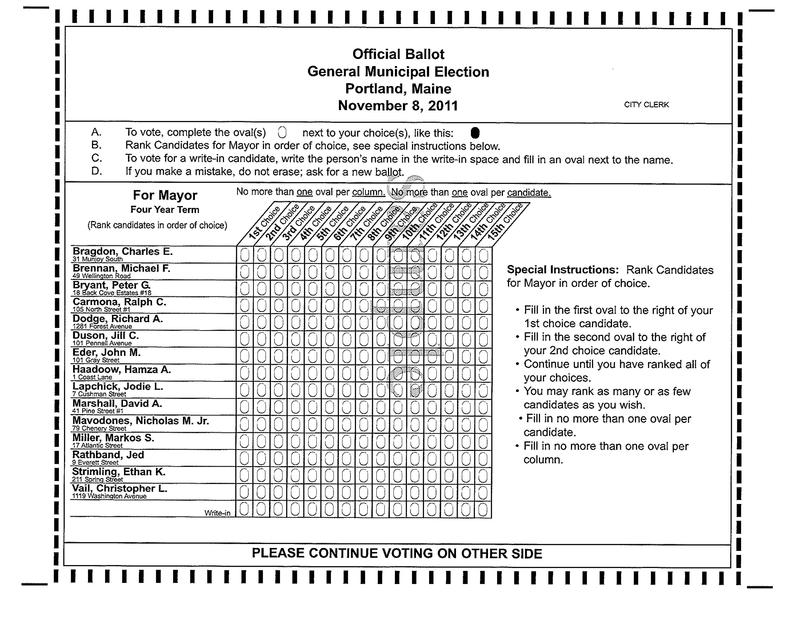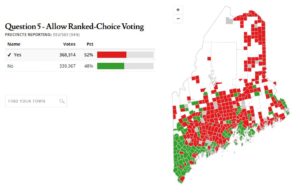There are folks in New Hampshire who have tried for decades, on and off, to institute some form of alternative voting, but our neighbors in Maine have gotten their first.
Pine Tree State voters on Tuesday approved a statute to establish ranked-choice voting for statewide races, beginning with the June 2018 party primary. In races with more than two candidates, voters can rank some or all them from first place to last, and if no candidate gets a majority of first-place votes, those rankings will be used to winnow out losers until a majority is achieved.
Similar systems are used in a few city elections and other places in the U.S., but this will be the first time it will be in place for statewide elections in this country.
As it turns out, Maine was ripe for the experiment because it’s had a lot of divisive multi-candidate races for statewide office, especially governor.
“In 9 of last 11 elections for governor, the winner received less than a majority of votes,” said Kyle Bailey, campaign chairman for the Committee for Ranked Choice Voting, a non-partisan group that pushed the initiative. “The last few weeks of the campaign was entirely about strategic voting –who’s the spoiler, I don’t want to waste my vote, who should I support to help my candidate – with no discussion about the issues.”
“We’ve been grappling with this probably longer than any place in the country. People are looking for improvement to the system,” he said.
Among other things, the ranked-choice voting initiative in Maine was supported by the League of Women Voters.
“People are kind of ready to deal with it,” said Rob Richie of FairVote, a D.C.-based group that advocates for alternative voting schemes. “Where Maine is, is where I think the country’s going: A rising number of unaffiliated voters , many third parties supported by people under 40.”
He pointed to Tuesday’s statewide races in New Hampshire, where nobody in any major office received a majority of votes. “That is an example. Did libertarian split the vote? What does it mean? You don’t know,” he said.
There have been a number of efforts in the New Hampshire legislature to allow alternative voting methods here, but not have gone anywhere. They date back at least to 1979 and cropped up as recently as this spring, when a proposal for a system called approval voting was tabled by a committee.
Advocates of ranked-choice, as well as similar voting systems which allow voters to choose more than one person per race, say they can weed out extremist candidates. The argument is that an extreme candidate will be pulled down by voters’ dislike.
“It levels the playing field for candidates with the best ideas and gives more choice and more voice to voters, so you never have to vote for the lesser of two evils,” said Bailey.
The mechanics of the switch will be fairly straightforward. Most Maine communities use machines that optically scan paper ballots, as is done ion New Hampshire. A one-time software upgrade will allow them to scan and register votes for multiple candidates at once.
If an instant recount is needed, the data from the machine will be sent to some central location where the secretary of state’s office will use voters’ ranks to weed out candidates.
It works like this: If no candidate gets a majority, the candidate with the fewest first choices is eliminated, and any voters gave that candidate their first choice have their ballots counted for their second choice. This process repeats, with last-place candidates dropped each round, until one candidate reaches a majority and wins. Votes counts for the second or latter choice only if the first choice has been eliminated.
The system will be used in races for U.S. Senate, Congress, governor, state senate and state representative, but not for local offices such as selectman and school board.



 Return to the Concord Monitor
Return to the Concord Monitor